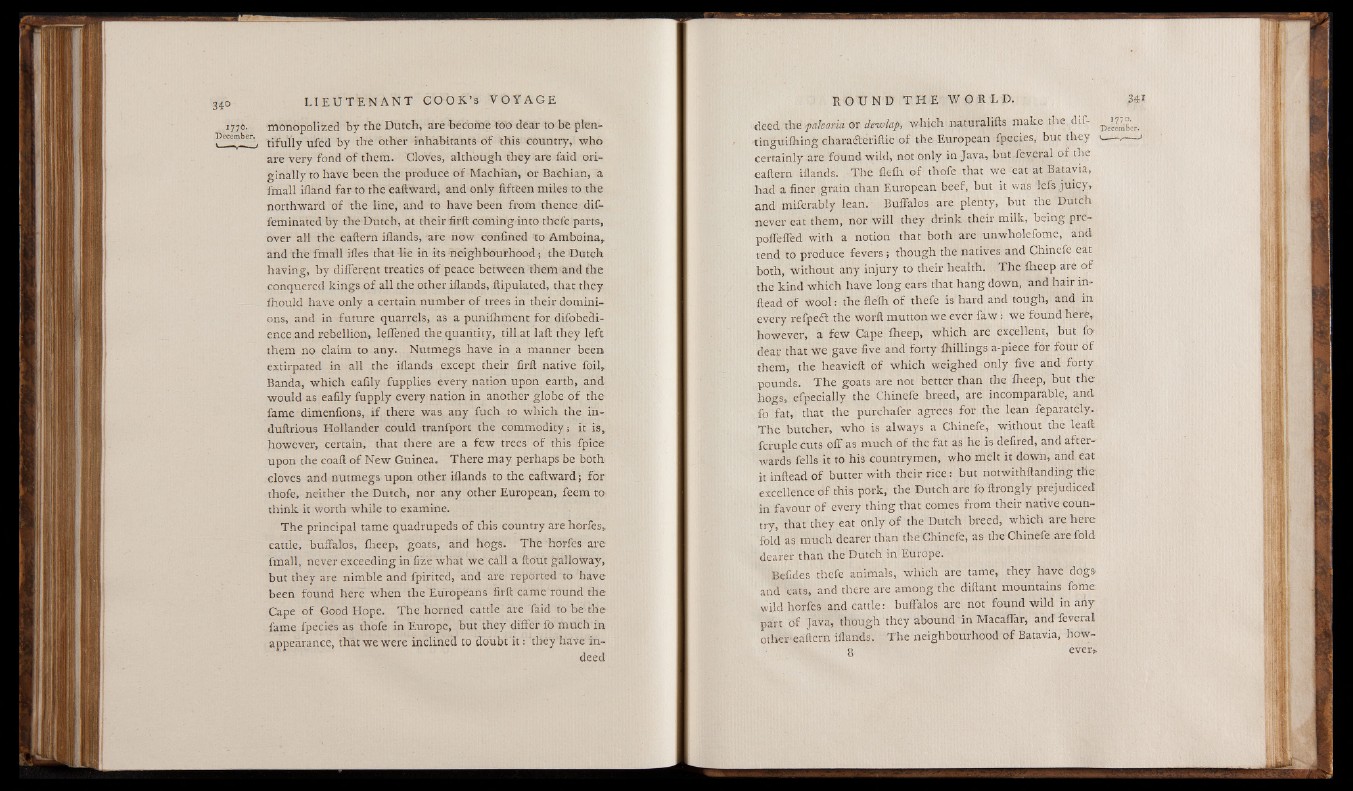
1770. monopolized by the Dutch, are become too dear to be plen-
December. ufe(] £,y the other inhabitants of this country, who
are very fond of them. Cloves, although they are faid originally
to have been the produce of Machian, or Bachian, a
fmall ifland far to the eaftward, and only fifteen miles to the
northward of the line, and to have been from thence dif-
feminated by the Dutch, at their firft coming into thefe parts,
over all the eaflern iflands, are now confined !to Amboina,
and the fmall ifles that lie in its neighbourhood; the Dutch
having, by different treaties of peace between them and the
conquered kings of all the other iflands, ftipulated, that they
fhould have only a certain number of trees in their dominions,
and in future quarrels, as a punifhment for difobedi-
ence and rebellion, lefiened the quantity, till at laft they left
them no claim to any. Nutmegs have in a manner been
extirpated in all the iflands except their firft native foil,
Banda, which eafily fupplies every nation upon earth, and
would as eafily fupply every nation in another globe of the
fame dimenfions, if there was any fuch to which the in-
duftrious Hollander could tranfporc the commodity; it is,
however, certain, that there are a few trees of this fpice
upon the coaft of New Guinea. There may perhaps be both
cloves and nutmegs upon other iflands to the eaftward; for
thofe, neither the Dutch, nor any other European, feem to
think it worth while to examine.
The principal tame quadrupeds of this country are horfes,
cattle, buffalos, fheep, goats, and hogs. The horfes are
fmall, never exceeding in fize what we call a flout galloway,
but they are nimble and fpirited, and are reported to have
been found here when the Europeans firft came round the
Cape of Good Hope. The horned cattle are faid to be the
fame fpecies as thofe in Europe, but they differ fO much in
appearance, that we were inclined to doubt it: they have indeed
deed the palearia or dewlap, which naturalifts make the diftinguifliing
chara&eriftic of the European fpecies, but they ---- -----1
certainly are found wild, not only in Java, butfeveral of the
eaflern iflands. The flefh of thofe that we eat at Batavia,
had a finer grain than European beef, but it was lefs juicy,
and miferably lean. Buffalos are plenty, but the Dutch
never eat them, nor will they drink their milk, being pre-
poffeffed with a notion that both are unwholefome, and
tend to produce fevers ; though the natives and Chinefe eat
both, without any injury to their health. The fheep are of
the kind which have long ears that hang down, and hair in-
ftead of wool: the flefh of thefe is hard and tough, and in
every refpett the worft mutton we ever faw : we found here,
however, a few Cape fheep, which are excellent, but fo>
dear that we gave five and forty fhillings a-piece for four of
them, the heavieft of which weighed only five and forty
pounds. The goats are not better than the fheep, but the
hogs, efpecially the Chinefe breed, are incomparable, and
fo fat, that the purchafer agrees for the lean feparately.
The butcher, who is always a Chinefe, without the leaft
fcruple cuts off as much of the fat as he is defired, and afterwards
fells it to his countrymen, who melt it down, and eat
it inftead of butter with their rice i but notwithftanding the
excellence of this pork, the Dutch are fo ftrongly prejudiced'
in favour of every thing that comes from their native country,
that they eat only of the Dutch breed, which are here
fold as much dearer than the Chinefe, as the Chinefe are fold
dearer than the Dutch in Europe.
Befides thefe animals, which are tame, they have dogs,
and cats, and there are among the diftant mountains fome
wild horfes and cattle: buffalos are not found wild in any
part of Java, though they abound in Macaflar, and feveral
other eaflern iflands. The neighbourhood of Batavia, how-
g ever»